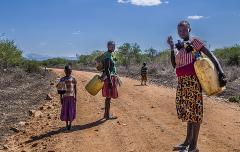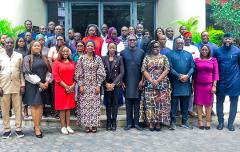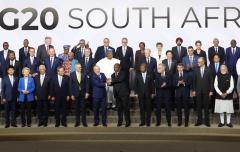Message by SEforALL Chief Executive on 2014 International Women’s Day
As we commemorate International Women’s Day, permit me in my capacity to salute and acknowledge the invaluable contribution that women around the world make each and every day in their households, communities and economies. This day is of great importance because very often their contribution to the global community often goes unrecognized.
Launched by Secretary-General Ban Ki-moon, the Sustainable Energy for All seeks to achieve three ambitious goals by 2030: universal access to modern energy services, a doubling of the global rate of improvement in energy efficiency, and a doubling of the share of renewable energy in the global energy mix.
In 2012, the United Nations General Assembly declared 2014 – 2024 as the International Decade of Sustainable Energy for All in recognition of the crucial role that energy play in socio-economic and sustainable development. As we begin the decade with a global campaign, we have dedicated years 2014-2015 to focus on the connection between energy, women and children’s health.
Energy and access to energy services are directly linked to the economic and social wellbeing of women. When energy services are present, opportunities open for women. The opposite is true when energy services are inadequate, too expensive, or simply not present. Women most often pay the highest price for energy poverty and the effects of such energy poverty can be seen most dramatically in health care, and especially in childbirth, where darkness can mean death, and where light can mean life.
Globally, WHO estimates about 4 million premature deaths a year (mainly children and women) due to pulmonary ailments, linked directly to household air pollution, primarily from the use of biomass as a source of energy and kerosene lamps for lighting; this is almost doubled the incidence of HIV/AIDS and Malaria combined.
Recent studies done under the DFID sponsored program called MAMAYE, have traced the primary cause of high maternal mortality to lack of electricity in primary health care units, poor sanitation, and haemorrhaging. Primary health workers are struggling to provide care using candles, kerosene lanterns and torchlights. In many instances, they can’t even charge their cell phones for emergency calls at their work sites.
We must end this. Increasing energy access will ensure healthier home environments and generate opportunities for women to earn a living for themselves and their families. Access to cleaner cooking solutions, modern fuels such as LPG and affordable clean stove technology can change this. When we do this, women and girls will no longer walk long distances to collect fuel wood, often risking their personal safety. In the case of girls, they will be able to attend school and attain literacy.
Reducing by half the rate of maternal mortality, women dying giving life to children, is one of the current MDGs. It has proven one of the most difficult MDGs to achieve for many of the poorest countries. This is directly related to the lack of electricity and the services that electricity provides in rural clinics such as lighting, sterilized instruments, hot boiled water, refrigerated medicines, diagnostic machines and basic conditions.
When mechanical power is present to pump water, grind food grains and process agricultural products, the economic wellbeing of women and their families improves. Liberated from the drudgery of hauling water, pounding millet or rice with sticks and doing other repetitive agricultural tasks, women can turn their time to more income generating activities.
Access to energy using equipment such as lights, presses, pumps and power for transport, opens economic opportunities for women. Energy is a key pre requisite for the economic empowerment of women. Energy is a woman’s issue but it is not theirs alone. It is a global issue. Energy is also my issue.
As the Commission on the Status of Women gets ready to discuss progress towards gender equality and women’s empowerment 10-21 March, I urge delegates to consider the key role that access to energy services, especially electricity, mechanical power and clean cooking systems play in enhancing women’s economic opportunities.
In my capacity as the Secretary-General’s Special Representative for Sustainable Energy for All and chief executive of the initiative, SEforALL join the rest of the United Nations system and the world to reaffirm our commitment to fight for women’s rights, sustainable energy for all in an effort to ensure equitable and sustainable development for all.



